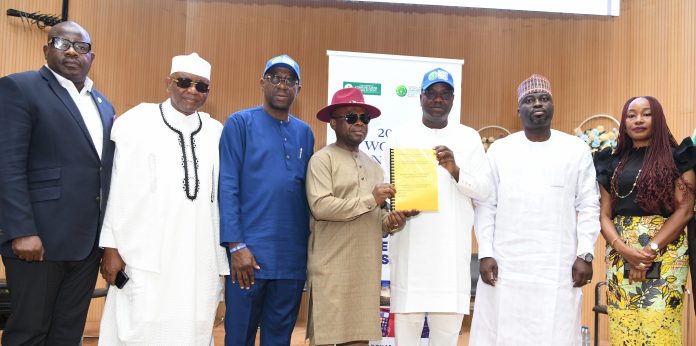The Executive Vice chairman of Nigerian Communication Commission (NCC), Prof. Umar Garba Danbatta has said the Commission is working on a policy to encourage the adoption of renewable energy sources by operators.
He said when operational, the policy will ensure that using clean energy sources for power has the potential to resolve the three key needs of the telecom industry; reduction in diesel usage; expansion of telecom infrastructure to off-grid areas; and reduction in carbon emissions. Collocation and Infrastructure Sharing Framework.
Danbatta spoke on Wednesday at the World Consumer Rights Day held in Abuja.
According to the Executive Vice chairman of NCC, the Policy on renewable energy in the telecom sector is an additional layer of other policies that contribute to protecting the environment.
Danbatta said the NCC is poised to realize the theme for this year (2023), which is “Empowering Consumers through Clean Energy Transition”.
He said the theme is geared towards delivering a smooth transition for consumers experiencing a high cost of living as the globe responds to the ongoing energy crisis caused by supply and climate issues. “This theme is very relevant given Nigeria’s recent licensing of the 5G spectrum networks, which consume twice as much energy as 4Gs, although they are more energy-efficient per gigabyte”.
He emphasised that in recent years, the Commission introduced a regulatory framework on infrastructure sharing and collocation among the licensees which has encouraged operators to fully maximize their already-deployment infrastructure.
“By sharing infrastructure, some operators do not need to entirely build a telecoms site in an area where another operator had deployed one. With the challenge of inadequate public electricity supply in Nigeria, telecom companies rely on diesel-powered generators to keep their telecom sites live round-the-clock.
“A regulatory framework such as infrastructure sharing, and collocation is helping in this regard and the Commission has recorded appreciable adoption of this regulation.Factoring in energy efficiency in Type Approval Another regulatory initiative in this regard is NCC’s Type Approval Regulations.
“For the sake of educating our media stakeholders, Type Approval is an official authorisation by the Commission prior to the use or supply of an Equipment Type in Nigeria” he said.
He added “Our Type Approval of devices factors in energy efficiency, among others, which ensures a reduction of power consumption. It also ensures that Radio Frequency devices used in Nigeria operate effectively, without causing harmful interference and otherwise comply with the Commission’s technical requirement prior to importation or marketing.
“ICT competitions focusing on renewable energy. The annual tech innovation competitions we organize for young innovators in Nigeria also make considerations for inventions that address the challenges of renewable energy. Some of the entries submitted in this regard are in the process of being commercialized as the innovators are seeking investors to make their discoveries available to the public” Danbatta said.
He assured that the Commission will continue to support research and innovations that contribute to transitioning to renewable energy sources.
He noted that regulations on e-Waste also connected to NCC’s regulatory efforts in dealing with issues of sanitizing the environment is its efforts in 2019 to commence activities that will result in the formulation of a Regulation on E-Waste in Nigeria.
Consequently, he stressed “today, the global concern for the regulation of e-waste is two-pronged. First, is the acute awareness of the hazardous properties and the potential risk to human health, as well as their capacity to degrade the environment.
“Secondly, is the business case and vast Potential for wealth creation in recycling e-waste into more benign and productive uses. In line with its regulatory mandate and to keep pace with efforts at managing e-waste-related issues, in a manner that reduces cases of indiscriminate burning of electronic devices with the potential for increased carbon emission in the environment, the Commission has been working, with other relevant agencies, to develop a Regulations on E-waste”.
Also speaking the Executive Commissioner, (Stakeholder Management), Adeleke Adewolu in an opening remarks revealed that the Nigerian telecoms industry today boasts of over 226 million voice customers and over 156million internet customers as at 31 January, 2023.
He declared that these consumers leverage on communications infrastructure for social interaction, health service, access to education, banking, explaining that as consumer volumes and service diversity continue to grow, network operators have to roll-out more infrastructure for coverage in new, mostly rural areas, and for network expansion in already saturated urban markets.

Call:
Sandra - 07069148333
Pauline - 08174374150
Scholastica - 09060678434













